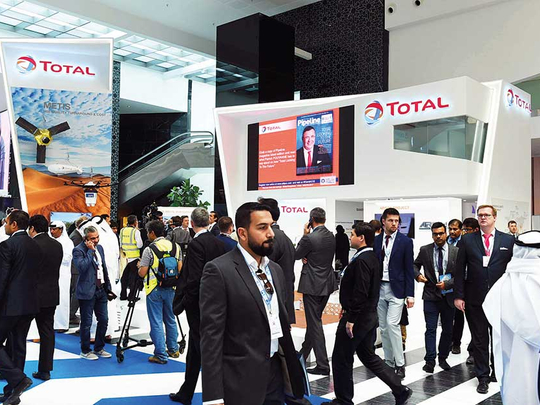
Abu Dhabi: Despite being at odds on a number of issues, the heads of two of the world’s largest oil companies can agree on one thing apparently: The industry must fight back against its cyclical nature.
While companies can’t change the fundamental nature of the sector, they can safeguard themselves against future downturns, and that was what Patrick Pouyanne, chairman and chief executive officer of Total, and Bob Dudley, group chief executive officer of BP, on Sunday suggested companies do.
Speaking at a panel session on the first day of the Abu Dhabi International Petroleum Exhibition and Conference (Adipec), Pouyanne talked about the boom and bust cycles that rule the oil and gas industry.
- Suhail Al Mazroui | Minister of Energy
Asked what he had learnt being CEO through such a turbulent time, the Total chief said, “One of the most interesting things is: How do you prepare, how do you benefit from the opportunities given to us in the low cycle? By preparing for the future growth of the company.”
Pouyanne explained that the opportunity presented to the industry in down times was low costs.
“When we are in a low cycle, we have low costs, because the whole industry adapts itself to a new level of costs. Because everyone wants to survive, they need to manage their costs,” he said.
So, for Pouyanne, the challenge currently facing the industry was how to break old habits, and begin to act countercyclically.
“This means to buy low and sell high … to sanction new projects when the costs are low,” he said, adding: “You need a strong balance sheet to do that. Strengthening our balance sheet was a priority for us.”
- Patrick Pouyanne | Chairman and chief executive officer of Total
Bob Dudley, the group CEO of oil giant BP, admitted that in this down cycle, BP had fallen into the same trap that Pouyanne was describing.
Since 2014, oil prices have been volatile, falling from $107 (Dh393) per barrel in May of that year, to nearly $30 per barrel less than two years later. They now sit at roughly $56 per barrel at the time of writing.
“This has been a brutal time, like 1986 to 1990 was. It reminds me of that time. We had to divest lots of assets to survive … as much as $75 billion,” Dudley said.
Panel moderator Steve Sedgwick of CNBC remarked: “It sounds fantastic, not selling off all of our trophies at the top of the cycle and we’re not going to be overinvesting at the top of the cycle.”
However, Sedgwick added, he found it hard to believe that the industry wouldn’t be “overly exuberant when the price of oil reaches $80 a barrel, and wouldn’t be in the depths of despair [when it] gets back down to $30 a barrel.”
We’re all trying to be countercyclical, responded Dudley.
- Bob Dudley | Group CEO of BP
“I think it’s important … we’ve been buying some things too while [the price of oil] is low,” he said.
Dudley warned against following the herd in tough times, though, and making strategic decisions based on what others are doing.
Ultimately, the industry needed “institutional learnings,” with lessons that were remembered in organisations “for a long time,” Dudley said, to prevent the pitfalls of a cyclical industry.
“We need to benefit from this low cycle to prepare for the next wave of growth,” added Pouyanne.












